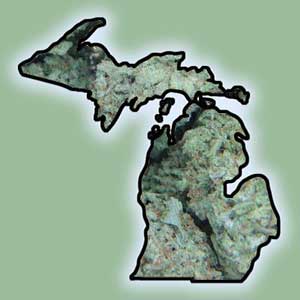 Virtual repeal of 2012-s synthetic marijuana ban, no local control, sales through pharmacies are highlights of the new Prairie Plant Bill
Virtual repeal of 2012-s synthetic marijuana ban, no local control, sales through pharmacies are highlights of the new Prairie Plant Bill
It’s been known by many names- the Anti-Local Option Bill, the Anti-Dispensary Bill, or merely the ‘Prairie Plant Paid For It Bill’. Whatever you choose to call it, the Michigan Senate is on the threshold of introducing legislation that would establish a system of medical marijuana greenhouses who distribute cannabis through your corner pharmacy.
Yes, pot sold through national big-box chain pharmacies.
The plan would not kick in until federal policy on marijuana law changes, which is rapidly evolving in a pro-marijuana direction. The proposed bill is not idle speculation pushed by some liberal lawmaker out to satisfy a vocal segment of their constituency, it is a tangible effort pushed by the Senate’s top three Republicans and a wealthy Canadian corporation.
Read the latest draft of the proposed bill HERE
WHO IS DRIVING THIS LEGISLATION
Prairie Plant Systems describe their specialty as “plant-based bio-pharmaceutical production that combines strict genetic containment, accelerated plant growth and unrivaled environmental control.” They market marijuana to Health Canada under the trademarked name “Cannimed”.
They successfully lobbied the Canadian government to eliminate the ability for qualifying patients to grow their own cannabis or to have another trusted individual cultivate on their behalf, opting instead for a system of large commercial cultivation sites that supply the entire nation’s medicinal cannabis patients. Prairie Plant is one of only two companies allowed to create and sell cannabis in Canada; that system is the commercialized model they are trying to establish in Michigan.
Prairie Plant Systems very famously brought legislators to tour their current cultivation operation, which utilizes Michigan’s abandoned mines to produce herbs and other foodstuffs underground. Their subsidiary, SubTerra, is the corporation’s Michigan agent. Several Representatives and Senators, and their staff members, have admitted to being given the Prairie Plant mine tour in Michigan or the garden tour in Canada.
Although Prairie Plant’s underground garden tour was publicized in April of 2012, and the bill supporting their cause was introduced in October of that same year, their Michigan lobbying firm has been working to establish a state-run cultivation system for nearly as long as the MMA has been in effect- April, 2009. Some of the current bill’s sponsors were among the first to be wined and dined by the commercial powerhouse, and Lansing is awash with stories of legislators recently being flown to giant Canadian cultivation centers to encourage their support.
This new version of last year’s failed bill, SB 1349, has some subtle changes- it no longer robs the MMA’s Medical Marihuana Fund for financial start-up resources, for example- but it contains many of the negatives that caused the cannabis community so much discomfort when it was first introduced, including an extensive set of testing requirements that managed to find their way into an early version of the Provisioning Centers Act, a dispensary-empowering bill that is also a carryover from the 2012 legislative session. That testing segment has since been modified to reflect standards currently utilized by Michigan’s marijuana testing businesses.
The 2013 version of the Prairie Plant Bill is being launched from Senator Roger Kahn’s office. Kahn, a medical doctor, co-sponsored last year’s version of the same bill along with the Senate Majority Leader Randy Richardville and Senator Rick Jones. Although the 2013 bill has not formally announced sponsors, Lansing insiders confirm that this trio is again at the helm.
Richardville is the leader of the Senate Republicans and his influence is vast. As Majority Leader he decides which bills are voted on by the Senate and which wither and die on the vine. 2012-s SB 1349 was assigned to his Committee- Governmental Oversight- and it is anticipated that this year’s version will be given the same assignment. That gives him the power to control debate, amendments and advancement of the Prairie Plant Bill.
Jones is on record as being in opposition to Michigan’s Medical Marihuana Act (MMA) for most of Michigan’s registered patients. He’s been confrontational in Committee meetings toward medical marijuana patients- even insulting patients and limiting public commentary on marijuana-related bills passing through the Senate Judiciary Committee he chairs.
In 2009, Senators Kahn, Kuipers, Van Workem and Cropsey introduced a package of bills intended to gut the then-new MMA and replace it with a state-run system of marijuana production and distribution. That proposal featured a half-dozen large marijuana growing operations instead of the produce-your-own system the voters selected in 2008 by a staggering 63% landslide. After some damning testimony from the ACLU and the medical marijuana community in 2010, that effort never made it out of Kahn’s Senate Judiciary Committee. Kahn is in the last of his term-limited sessions in the Senate; Cropsey works in the office of Michigan’s Attorney General.
Kahn’s office did not return multiple telephone calls for a quote.
Some highlights:
- The state will license marijuana production facilities, called a “Pharmaceutical-grade cannabis licensed facility”, which exclusively manufacture, cultivate and tests cannabis. No distribution of cannabis would be allowed at any location other than a pharmacy.
- All cannabis must be sold from the cultivation facility to a pharmacist directly. “A pharmaceutical-grade cannabis licensed facility shall sell pharmaceutical-grade cannabis only to a licensed pharmacist or retail pharmacy to be dispensed only to patients…” Direct interactions between patients and the cultivation facilities are crimes.
- Local communities could not refuse to accept a cultivation facility in their area; “a local governmental unit shall not enact or enforce an ordinance regarding pharmaceutical-grade cannabis licensed facilities.” Any locally-enacted zoning requirements could not eliminate the Facilities, and must meet a state-defined standard of “reasonable”.
- Each ‘prescription’ for medicinal cannabis would have to contain the “Name, address, and federal Drug Enforcement Administration number of the dispensing pharmacy and the initials of the pharmacist who fills the prescription.”
- No caregivers are allowed under the proposed system, so those who are too sick to visit the pharmacist are not able to designate a surrogate to acquire on their behalf.
- The Prairie Plant Bill would create a parallel registry program similar to the Michigan Medical Marihuana Act (MMA), including registry identification cards, but individuals must sacrifice their MMA status and all rights to cultivate cannabis if they choose to enroll in the Prairie Plant Bill program.
- Pediatric cannabis use is not allowed under the Prairie Plant Bill guidelines, regardless of how many physicians believe the child would receive therapeutic benefit.
- No transfers between patients- even if there is no compensation involved.
- Although the Prairie Plant Bill is predicated on a change in federal laws, the proposed bill has enough push behind it to get it introduced for a second legislative session in a row.
IT ALLOWS THE CREATION AND DISTRIBUTION OF SYNTHETIC MARIJUANA
Synthetic versions of marijuana were outlawed in Michigan via Public Act 183 of 2012. It created Section 7212 (1)(e) and (1)(x) of the Public Health Code to remove dangerous designer drugs from gas station and convenience store shelves. The language was created by Senate Bill 1082, which used 95 lines of text in section (e) to explain the details and intricacies of the ban on products that were killing Michigan youth. The Prairie Plant Bill discards nearly all that detailed and intricate language, substituting instead this minimalist passage:
(e) EXCEPT AS PROVIDED IN SUBSECTION (2), COMPOUNDS of structures of substances referred to in subdivision (d), regardless of numerical designation of atomic positions, are included.
The Prairie Plant Bill also completely eliminates the 32-line Section (1)(x) that outlawed synthetic cathinones, used as a catch-all segment intended to give prosecutors a tool against emergent drugs not previously defined but containing dangerous components.
The exception listed in (1)(e) in the Prairie Plant Bill authorizes the distribution, creation and acquisition of synthetic cannabinoids, and makes those substances a Schedule 2 drug in Michigan- as long as they are created in Prairie Plant Bill facilities and are sold in pharmacies. Synthetic cannabis is a classification which includes K2, spice, bath salts, herbal incense and any other derivation chemists can come up with.
The elimination of these protections diminishes the work of legislators, parents and the Governor in favor of a system that allows for commercial exploitation of a product that, unlike marijuana, has demonstrably caused death. The re-emergence of synthetic marijuana is not supported by any marijuana law reform organization, in Michigan or nationally.
LOOSER REGULATIONS THAN THE MMA
In some respects, the Prairie Plant Bill allows more Michiganders the right to use medicinal cannabis.
In the MMA, the responsibility of making a ‘recommendation’ for medicinal cannabis use is reserved for “a Doctor of Medicine (MD) or Doctor of Osteopathic Medicine and Surgery (DO) fully licensed in the state of Michigan,” per the Licensing and Regulatory Affairs website. In the Prairie Plant Bill, “a physician” may make the recommendation.
No establishment of a prior relationship between the doctor and patient is articulated in the Prairie Plant Bill; the current system of specialty physicians, often referred to as ‘pot docs’ by the very supporters of this legislation, would flourish and prosper. The language of the MMA requires a bona-fide doctor-patient relationship, and that relationship was further defined in legislation Governor Snyder signed into law in 2013. The Prairie Plant Bill makes no such distinction, and eliminates the records review, record keeping, in-person evaluation and follow-up care requirements drafted into law for participants in the MMA.
Under current law, registered medical marijuana patients are restricted to 2.5 ounces of dried usable cannabis; the Prairie Plant Bill contains no restrictions on possession amounts. Similarly it lacks any definition as to the amount of cannabis that licensed and certified facilities can grow, or hold, or sell, or transfer to pharmacies. All the safeguards that were contained in the MMA are left undefined, opting instead to allow LARA to decide those limitations on their own after the bill is passed into law, without legislative debate or a vote.
The Prairie Plant Bill allows law enforcement to learn the registered patient’s illnesses and symptoms, the name and address of the recommending physician, and the history of obtaining marijuana prescriptions (if technology allows it). This relaxation of the privacy provisions contained in the MMA is of great concern to the medical cannabis community.
Lansing politicos have opined that the new Prairie Plant Bill will be assigned a Senate Bill number and be introduced during the last week of October.
Source: The Compassion Chronicles







